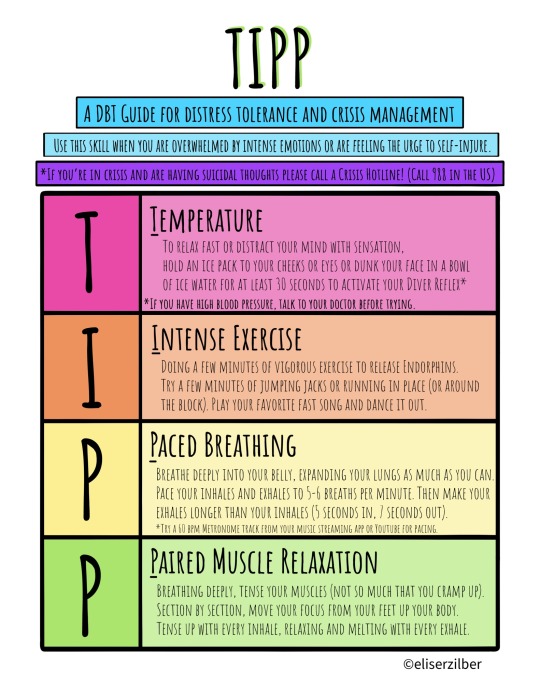#dialectical behavioral therapy
Text
DBT won't fix you, it won't make you not be mentally ill anymore, it won't tell you what's most important in your life and give you back everything you're missing- at least, it usually won't.
What it *is* is a set of tools that can help you wiggle out of traps. Internal traps, social traps- you know, when everything goes slantwise and wrong.
The more you practice and understand them, the more they work. On days when you practice and read them, they work way more.
60 notes
·
View notes
Text




this was April 2009. i was living in a mobile home on a piece of property outside hamburg pa. i was deciding to get out of pa. i was sick of it. the only people i met were in aa. i didn't meet any artists. i was in a group dialectical behavior therapy and the course leaders didn't wan't me to leave. they wanted me to finish the course. but, i just couldn't stand to be depressed in pa no more.
#2009#HamburgPA#travels with jello#roadtrip#night#recovery#sobriety#aa meetings 5 days a week#one on one talk therapy#group therapy#dialectical behavioral therapy#dbt
3 notes
·
View notes
Text
How to Make Peace With Your Fear
How to Make Peace With Your Fear
Begin by Listening to Your Body Using Your Wise Mind
When it comes to making decisions it can become easy to feel conflicted about a particular decision or action, if we listen careful enough our bodies will hold the answer to our true discernment. In dialectical behavioral therapy, this ‘bodily intuition’ is called the ‘wise mind.’ in therapeutic speak, a mindful awareness of emotions, or…

View On WordPress
3 notes
·
View notes
Text
Because of my diagnosis of autism in September 2023, I was in a full eight-session course of Dialectical Behavior Therapy group this winter. I've been thinking about it a lot, so I have some comments to share. Feel free to skip this if it's not interesting, but I know a fair amount of fellow autistic or BPD people are on Tumblr and might end up considering emotion regulation therapy.
Some stuff from DBT was distress management, which was useful. For me it was worth it for that alone. So from the start, I do recommend it if you are offered it. But:
Some of DBT was the therapist failing to explain basic masking to a group of autistics and people with BPD. This was because whoever developed the course she was rushing through did not examine the reason WHY these people haven't learned masking skills already. It was usually because those that hadn't, had never had explained to them the difference between expected social diplomacy and lying.
See, I'm going to explain this now, from the POV of a Level 1 late-diagnosed autist with pretty decent masking skills. So this is going to seem super obvious to those of you that are neurotypical.
Many people with autism feel inherently that concealing your feelings or opinions is the same as lying, and that you are doing someone specific harm by not telling them when you know they're wrong. We can't read tone or expression well a lot of the time, so it's not clear to us when someone is saying something just to be polite, or otherwise saying other than what they mean. And we hate not knowing what people mean. So we tend to just SAY what we mean. The natural result is that the autistic person sounds like a rude asshole to everyone except other autists. It's not unusual for people with BPD to have a similar problem, as I learned from my fellow patients!
Neurotypical people generally agree that lying is wrong in a broad sense, but they also preserve an internal distinction between lying that is wrong and stating a non-fact for social reasons that are obvious to the listener. No one tells the autistic person about this, because you're supposed to just know it.
An example of this that we discussed in class is that a coworker in a lunch discussion says the world is flat. Now, you, the autist, know that's not true. But the important fact is that everyone around you does, too. So when you gently deflect the person by politely saying, "Wow, Dave, that's interesting. I've never heard that before," everyone around you is NOT assuming you believe Dave. They assume that you are being polite. You're not actually lying or deceiving anyone, because everyone actually knows what you mean ("I'm not comfortable with this, let's change the subject"). It's possible even Dave will get the message and not bring it up again, depending on how good Dave is at reading the room himself.
This is a much better use of your time and social presentation than point-blank telling Dave he is nutter butters and starting an argument that ruins everyone's lunch break. Because at that point it's not Dave everyone blames, it's YOU. Everyone knows Dave is wacky about the flat earth, why can't you just skim over it as fast as possible so we can all get him off the topic?
The important skill to learn here is when not to engage on something. If you don't agree from day 1 that sometimes there's a Dave and we don't have to point out they're wrong, you simply can't function or mask for longer than it takes for someone in a conversation to say something you don't agree with. This is a very common autistic problem.
Because the fact is that there will definitely be times where you are sure someone is wrong, even Dave and the flat earth level wrong, but it's NOT obvious to everyone. If you can also learn not to try to correct everyone when that happens, you can be a lot less annoying to other people socially. (And I do mean socially here; obviously if you work at a nuclear plant or something and see someone doing something unsafe, you have to speak up, and I'm saying that because I know a lot of us are also very literal.) But you definitely don't have to tell Madison, your boss who can fire you, that there is no evidence essential oils have other than a placebo effect on any health condition. You can say that's very interesting, Madison, and hey did you watch the game? For "the game" you can swap out something else you know Madison likes. It doesn't really matter what it is, it matters that you got her off the thing you disagree with onto something you don't care about, and then you shut up and let her talk about it, so she still has a positive feeling about the conversation.
This is the most basic thing on earth, and if any neurotypicals are reading this you probably can't fathom how anyone doesn't know this. This makes a lot more sense if you are coming at it from the point of view of never, your entire life, knowing what people mean by a certain tone, or what the thing they're doing with their face exactly means. It's very possible to learn these things (not easy, but possible), but you have to first realize there's something there TO learn, and that learning it is not BAD or EVIL, and that's a hurdle my DBT course failed to clear immediately for most of my classmates.
#autism#dbt#dialectical behavioral therapy#bpd#borderline personality disorder#masking#late diagnosed autistic
1 note
·
View note
Text
How to Find the Right Therapist - From a Therapy Regular
Have you decided to go to therapy, but struggling to find the right therapist? Or maybe you're in therapy, and not sure if it's time to go your separate ways. This comprehensive guide was designed to help you wherever you are on your therapy journey.
Have you decided to go to therapy, but you’re struggling to find the right therapist? Or maybe you’re in therapy, and not sure if it’s time to go your separate ways. This comprehensive guide was designed to help you make the right choices for your mental health journey.
Choosing the Right Therapist can be… tricky
So you’ve finally decided it’s time to see a therapist. This is a great step…

View On WordPress
#choosing the right therapist#cognitive behavioral therapy#dbt#dialectical behavioral therapy#emdr#emdr therapy#healthy habits#how to choose a therapist#mbct#mbsr#mental health#mental health blog#mental health blogger#mental wellness#psychodynamic therapy#somatic therapy#therapist#therapist green flags#therapist red flags#types of therapy#Wellness#when to go to therapy
0 notes
Text

Dialectical Behavioral Therapy
Dialectical Behavioral Therapy (DBT) is a comprehensive therapeutic approach integrating cognitive and behavioral strategies for enhanced emotional regulation and interpersonal effectiveness!
#https://synergysobrietysolutions.com/dialectical-behavioral-therapy-dbt/#Dialectical Behavioral Therapy#Dialectical Behavioral Therapy (DBT)#Dialectical Behavioral Therapy Treatments#Dialectical Behavioral Therapy Near Me#Dialectical Behavioral Therapy In Palm Beach Gardens#FL#DBT Treatments#DBT Therapy#addiction treatment west palm beach#addiction therapy near me#drug and alcohol treatment center#substance abuse treatment#addiction recovery#residential rehab facility#outpatient rehab program#detoxification services#dual diagnosis treatment#individualized care plans#evidence-based therapies#holistic approach#12-step program#behavioral therapy#cognitive-behavioral therapy#relapse prevention strategies#family counseling#group therapy#medication-assisted treatment#aftercare services#sober living community
0 notes
Text
Embracing Emotional Resilience: Dialectical Behavioral Therapy in West Florida
There are many stressors in life, therefore developing the ability to tolerate discomfort is essential for mental health. Dialectical Behavioral Therapy gives people the tools they need to deal with crises and get through challenging circumstances without engaging in destructive behavior towards holistic wellbeing in West Florida. Please check our website for further details right away.

1 note
·
View note
Text
Understanding Trauma: Types, Symptoms, and Effective Methods for Healing
Trauma is an emotional response to a distressing event that overwhelms an individual’s ability to cope. Trauma can be experienced in various ways, and the effects can last for an extended period. The types of trauma are numerous, and they differ in their origins and severity. In this article, we will discuss some of the different types of trauma and provide examples of each from real-life…
View On WordPress
#cognitive behavioral therapy#dialectical behavioral therapy#EMDR#healing from trauma#narrative therapy#psychodynamic therapy#symptoms of trauma#therapy methods for trauma#trauma#types of trauma
1 note
·
View note
Text
10 TIPS FOR COPING WITH WORKING REMOTELY AND SOCIAL DISTANCING
1. Build Structure. Lack of daily structure can be a set up for worry, anxiety and negative emotions. Create a schedule for your work days including the start and end of the workday, with set times for meals and planned breaks. Having a regular routine will help you to maintain a positive mindset, increase productivity and manage anxiety.
2. Limit your time on social media and the news. Don’t make your phone the first thing you see in the morning and the last thing you check at night before sleep. Mindlessly scrolling and reading about the same news stories again and again kicks up negative emotions and provides little new information.
3. Get sleep. A sufficient amount of good quality sleep is vital to maintaining a healthy mind and body. Regulate your sleep cycle by getting up at the same time every day regardless of when you fall asleep. Practice relaxation exercises before bedtime—try a guided body scan or progressive muscle relaxation.
4. Exercise. Physical exercise is a proven mood booster and effective stress management tool. If you’re unable to get outside for a walk, run, or bike ride, check out online yoga or fitness classes.
Read More: https://drlisanapolitano.com/blog/10-tips-for-coping-with-working-remotely-and-social-distancing/
0 notes
Text

51 notes
·
View notes
Text
"the jedi don't have therapists-"
jedi philosophy, and in particular the practices and teachings that jedi were expected to implement in their everyday lives, was therapy. dialectical behavior therapy (dbt), to be exact. anyone who's familiar with dbt knows where i'm already going with this, but like genuinely look up the basic tenets of dbt and it's identical with what the jedi were doing.
dbt, to put it simply, is a specific therapy technique that was designed for ptsd and past trauma. it's pretty different from traditional talk therapy. it combines a few different environments (individual, group, etc.), recognizing that no single format of treatment can stand alone.
the key focuses of dbt include:
emotional regulation- understanding, being more aware of, and having more control over your emotions
mindfulness- regulating attention and avoiding anxious fixation on the past or future
interpersonal effectiveness- navigating interpersonal situations
distress tolerance- tolerating distress and crises without spiraling and catastrophizing
i'm sure it's already clear from that list alone how much the jedi teachings correspond with the goals of dbt. the jedi value, teach, and practice the following:
identifying and understanding emotions
mindfulness and living in the present
compassion, diplomacy, and conflict resolution (on interpersonal scales, not just planetary or galactic)
accepting and tolerating certain levels of distress or discomfort (particularly mental, such as discomfort at the thought of losing a loved one to death)
idk man seems almost as if jedi mental health practices and dbt are two sides of a completely identical coin. (fun fact: both star wars and dbt are products of the 70s.)
and guess what? dbt was specifically designed as a treatment for borderline personality disorder. remember that one? or, if you don't, maybe you remember a specific character, the one who was literally used as an example by my professor in my undergrad psych class when she was teaching us about bpd?

tldr: simply existing within the jedi community, practicing jedi teachings, surrounded by a support network of other jedi of all life stages, was the therapy for anakin. even when viewed through a modern lens. it was even, more specifically, the precise type of therapy that has developed in modern times to treat the exact types of mental issues he was struggling with.
#dbt#dbt therapy#dbt skills#dialectical behavior therapy#bpd#borderline personality disorder#anakin skywalker#anakin#star wars#sw#prequel trilogy#prequels#jedi#jedi culture#jedi philosophy#pro jedi#jedi appreciation#jedi order#attachment#non attachment#mindfulness#in defense of the jedi
3K notes
·
View notes
Text
That one trend but it’s one increment at a time bc rejection sensitivity dysmorphia has me scared of looking like an idiot with 4 notes ahaha
50 notes & I will
drink more water (easy since I drink like none ever)
regularly post lil hydration reminders
set a new goal
#idek how to tag this#that one trend#if this gets notes#stay hydrated#does this count as body doubling lol#audhd things#autistic things#adhd life#executive dysfunction#autistic self care#self care#adhd autistic#autistic borderline#neurodiversity#undiagnosed chronic illness#self improvement#baby steps#goal setting#audhd creature#dialectical behavior therapy#post traumatic growth#cptsd healing#trauma recovery#autistic system#did osdd
56 notes
·
View notes
Text
WHY does nobody understand. that Spock is a Bitch. this is not a character flaw indeed it is an integral part of his personality that doesn’t actually contradict his deep kindness and compassion!! and actually BOTH of those are traits of his that people fail to recognize and I think it does a very serious disservice to his character. he would not be Spock without these fundamental building blocks (among others)
#fundamentally Spock is a long list of contradictory natures synthesized into one person. it’s the base idea of his character#that and the fact that many of these things aren’t actually contradictory even when he has a hard time recognizing that#honestly. he’s like a dialectical behavioral therapy handbook come to life and I love him for it#Star Trek
2K notes
·
View notes
Text

TIPP
Use this skill when you are overwhelmed by intense emotions or are feeling the urge to self-injure.
*If you’re in crisis and are having suicidal thoughts please call a Crisis Hotline! (Call 988 in the US)
T - Temperature: To relax fast or distract your mind with sensation, hold an ice pack to your cheeks or eyes or dunk your face in a bowl of ice water for at least 30 seconds to activate your Diver Reflex*.
*If you have high blood pressure, talk to your doctor before trying.
I - Intense Exercise: Doing a few minutes of vigorous exercise will release Endorphins. Try a few minutes of Jumping Jacks or running in place (or around the block). Play your favorite fast paced song and dance it out.
P - Paced Breathing: Breathe deeply into your belly, expanding your lungs as much as you can. Pace your inhales and exhales to 5-6 per minute. Then make your exhales longer than your inhales (5 seconds in, 7 seconds out).
*Try a 60 bpm Metronome track from your music streaming app or YouTube for pacing.
P - Paired Muscle Relaxation: Breathing deeply, tense your muscles (not so much that you cramp up) section by section, move your focus from your feet up your body. Tense up with every inhale, relaxing and melting with every exhale.
*More DBT guides here*
#dbt#dbt guide#dbt skill#dbt skills#dialectical behavior therapy#therapy#resource#resources#bpd thoughts#actually bpd#bpd#borderline pd#borderline personality#bpd life#bpd problems#bpd shit#bpd stuff#crisis plan#crisis management#distress#tolerance#distress tolerance#TIPP#tipp skill
100 notes
·
View notes
Text
Dialectical Behavioral Therapy Treatments

Synergy Treatment Services - Dialectical Behavioral Therapy (DBT)
Dialectical Behavioral Therapy (DBT) is a highly effective and evidence-based treatment approach that has been proven to help individuals struggling with various mental health disorders, including borderline personality disorder, bipolar disorder, and eating disorders. This comprehensive therapy combines aspects of cognitive behavioral therapy with mindfulness techniques to address emotional dysregulation and improve interpersonal effectiveness.
We will delve deeper into the components of dialectical behavior therapy, or DBT, and how it works in addressing complex psychological issues. We will also discuss the benefits of DBT skills training for those seeking professional drug and alcohol treatment and other mental health services. Moreover, we will provide insight into Borderline Personality Disorder – the core issue DBT was created to handle – and what can be expected during individual therapy or group skills training. Elevate your well-being through Dialectical Behavioral Therapy Treatments, specialized modalities designed to integrate DBT principles, fostering emotional balance and improved coping mechanisms.
WHY CHOOSE US
The Benefits of Dialectical Behavioral Therapy for Addiction Recovery
Dialectical Behavioral Therapy (DBT) can help with cognitive behavioral treatment for individuals struggling with addiction in many ways:
Improved emotional regulation: DBT helps manage emotions for a more stable mental state.
Increased self-awareness: Mindfulness practices help make healthier choices in response to triggers.
Improved communication skills: DBT enhances assertive expression while maintaining healthy relationships.
Increased problem-solving abilities: DBT teaches constructive approaches to challenges.
Decreased impulsivity: Distress tolerance skills help resist impulsive behaviors that may lead back into addiction cycles.
Overall improvement in well-being and quality of life.
DBT is an effective treatment option for long-term recovery at Synergy Sobriety Solutions’ Palm Beach location.
How Does Dialectical Behavioral Therapy Work?
Dialectical Behavioral Therapy (DBT) helps individuals identify and replace unhelpful behavior patterns through mindfulness, distress tolerance, emotion regulation skills, and interpersonal effectiveness.
Mindfulness: Practice being present in the moment without judgment to increase self-awareness and promote healthier decision-making.
Distress Tolerance: Learn how to cope with difficult emotions or situations without harmful behaviors like substance abuse.
Emotion Regulation: Develop more effective strategies for managing intense emotions like anger or sadness.
Interpersonal Effectiveness: Learn communication skills that foster healthy relationships and reduce conflict with others.
DBT treatment programs often include group and individual therapy sessions for sharing experiences and support. At Synergy Sobriety Solutions in Palm Beach, Florida, our comprehensive approach incorporates individualized counseling and support group work for long-term success.
What is Dialectical Behavior Therapy (DBT)?
Cognitive-Behavioral Techniques: Identify and change negative thought patterns contributing to emotional distress.
Cognitive-Behavioral Techniques: Identify and change negative thought patterns contributing to emotional distress.
Mindfulness Practices: Incorporate mindfulness exercises such as deep breathing or meditation to increase awareness of thoughts and feelings.
DBT is effective for treating mental health conditions, including Borderline Personality Disorder (BPD), substance use disorders, depression, anxiety disorders, binge eating disorder and disorders, and post-traumatic stress disorder (PTSD). Synergy Sobriety Solutions’ skilled therapists utilize tailored DBT techniques as part of our comprehensive drug and alcohol treatment services in Palm Beach, Florida, near the beach.
How Long Does Treatment Last?
Dialectical Behavioral Therapy (DBT) duration varies based on individual needs but typically lasts 12-24 weeks. You’ll work closely with your therapist to develop the healthy coping skills necessary for long-term success.
Your mental health diagnosis and symptoms affect the length of treatment.
The severity of your substance abuse issues also plays a role.
Your commitment to attending therapy sessions and practicing new skills outside of sessions is crucial.
Co-occurring disorders or additional challenges may require more time.
Synergy Sobriety Solutions‘ programs in Palm Beach, Florida, provide comprehensive support throughout your DBT journey. Our staff customizes every program to suit your requirements, guaranteeing you the most effective treatment available.
Borderline Personality Disorder: A Rollercoaster of Emotions
BPD is a psychiatric disorder that results in erratic feelings, an unstable sense of self, and troubled interpersonal relationships. People with BPD may experience drastic emotional shifts, act impulsively, and have difficulty sustaining healthy relationships. BPD’s underlying cause is a mix of genetic predisposition, neurochemical imbalances, and environmental influences such as early childhood trauma.
Fear of abandonment is a common symptom of BPD.
Unstable personal relationships can be a challenge for those with BPD.
Feelings of emptiness can persist for long periods of time.
Irritability and anger outbursts can be triggered easily.
Self-harm and suicidal ideation may be experienced over extended periods.
Dialectical Behavioral Therapy (DBT) has been proven effective in treating BPD by using mindfulness skills and teaching essential skills for emotional regulation and interpersonal effectiveness. Utilizing DBT techniques integrated with other therapeutic models, our highly experienced therapists at Synergy Sobriety Solutions assist clients with achieving lasting recovery from substance use disorders, self-destructive behaviors, and co-occurring mental health conditions like Borderline Personality Disorder.
What to Expect During a Dialectical Behavioral Therapy Session
Be ready to confront your issues and gain knowledge of fresh capabilities and behavioral skills to boost your mental health.
Mindfulness Exercises: Practice deep breathing and meditation techniques to become more aware of your thoughts and feelings.
Distress Tolerance Skills: Learn strategies for coping with difficult emotions and engaging in healthy distractions.
Emotion Regulation Techniques: Develop tools for managing intense emotions like anger, sadness, or anxiety.
Interpersonal Effectiveness Strategies: Improve communication skills by practicing assertiveness, setting boundaries, and expressing needs effectively.
Your DBT therapist may also assign homework assignments between sessions so that you can continue practicing what you’ve learned at home. Commitment is key to achieving long-term success with DBT treatment from a licensed mental health professional at Synergy Sobriety Solutions, Palm Beach.
Conclusion - Dialectical Behavioral Therapy
DBT is a game-changer for addiction and treating borderline personality disorder, using individual therapy, group therapy, and skills training to regulate emotions, improve relationships, and develop healthy coping mechanisms. Don’t suffer in silence – seek professional DBT therapy and comprehensive DBT treatment with Synergy Sobriety Solutions to achieve long-term recovery and self-respect with evidence-based techniques like mindfulness meditation and cognitive-behavioral strategies!
#https://synergysobrietysolutions.com/dialectical-behavioral-therapy-dbt/#Dialectical Behavioral Therapy#Dialectical Behavioral Therapy (DBT)#Dialectical Behavioral Therapy Treatments#Dialectical Behavioral Therapy Near Me#Dialectical Behavioral Therapy In Palm Beach Gardens#FL#DBT Treatments#DBT Therapy#addiction treatment west palm beach#addiction therapy near me#drug and alcohol treatment center#substance abuse treatment#addiction recovery#residential rehab facility#outpatient rehab program#detoxification services#dual diagnosis treatment#individualized care plans#evidence-based therapies#holistic approach#12-step program#behavioral therapy#cognitive-behavioral therapy#relapse prevention strategies#family counseling#group therapy#medication-assisted treatment#aftercare services#sober living community
0 notes
